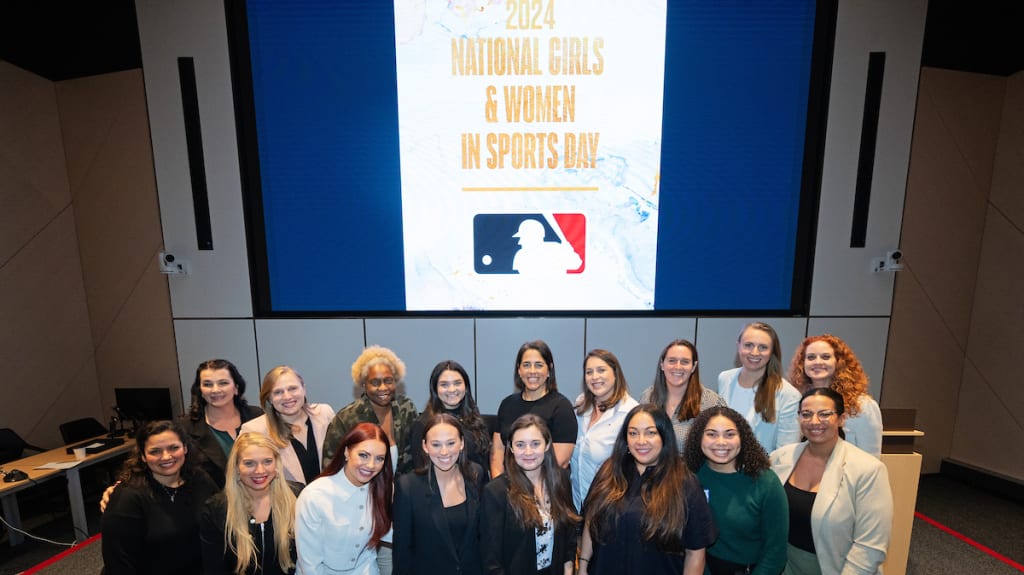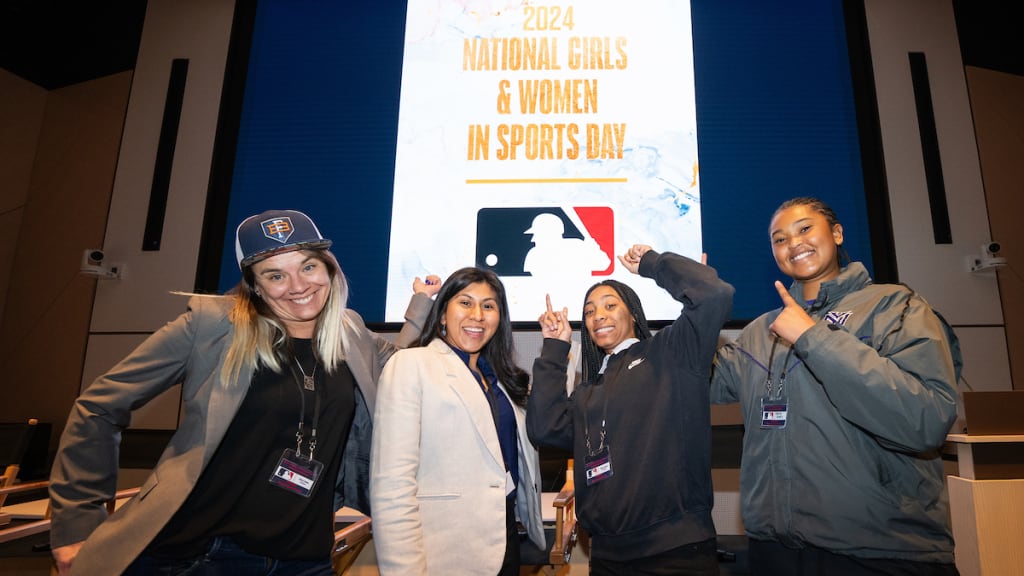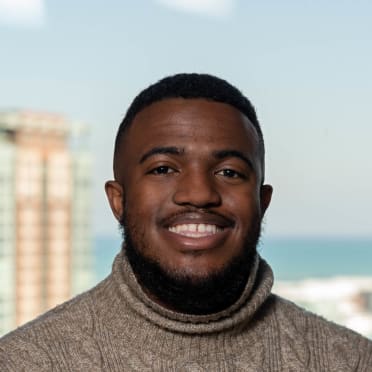NEW YORK -- The below-freezing winds and hustle and bustle of midtown Manhattan are sometimes enough to dampen the spirits of anyone entering a skyscraper on a weekday morning. But there was no sign of subdued energy on Wednesday at MLB headquarters.
Where corporate elevators can be often filled with uncomfortable silence, anticipatory enthusiasm and excitement tinged the interactions at 9 a.m. ET as people filed into the Commissioner’s Office auditorium.
As part of the celebration for the 38th annual National Girls & Women in Sports Day, MLB hosted its second annual networking event, inviting approximately 70 participants to learn from current employees and executives at MLB, Major League clubs and Minor League teams.
Expanding on the structure of the inaugural event, attendees fell into three categories -- current college softball or baseball athletes, current college softball or baseball coaches (or graduate assistants) or recent graduates who played either sport -- with the goal of highlighting a variety of potential career paths.
“You definitely see it in all these ladies today,” said Lauren Gardner, the host of MLB Network’s “Off Base” and the moderator of the two panels at the event. “They’ve had very long, interesting paths to get here -- I say this about my own position. I don’t think there’s any blueprint. … It’s important to really digest everything and then do what works best for you.”
The emphasis on the possibilities in the varied landscape was made from the outset. After a rousing introduction about the importance of opening doors for others, from vice president of baseball and softball development David James, and advocating for the need for representative role models, by MLB softball ambassador (and former Olympian) Natasha Watley, the attendees separated into breakout rooms for eight workshops with current MLB employees.
In a new wrinkle, the sessions spanned the league’s purview of responsibilities -- legal, global consumer products, human resources, gaming, global cultural/brand partnerships, front office and field staff diversity, Arizona Fall League development and content. Attendees filled out a survey to determine which fields they were interested in, then were placed into the groups depending on their responses.
Headed by the likes of senior director of front office and field staff diversity Tyrone Brooks, Nationals beat reporter Jessica Camerato and vice president of human resources Diane Cuddy, the participants were able to pick the brains of the top minds in their preferred fields in an intimate setting. No question was turned away, no inquiry about their journey was too personal. And to many, that unique access was invaluable.
“I think the workshops were really good,” said Karavin Dew, head coach of the Lafayette College softball team, who attended for the second straight year. “I really valued that smaller feel and the understanding of what people’s roles are. I think last year was really eye-opening, because most of us didn't know about how many jobs and how many roles fall under the MLB umbrella.”
Following two rotations of breakout sessions, the whole group returned together for the first of two panel sessions. Centered on highlighting the journeys of numerous influential women on the business operations side, the résumés of the panelists read like a laundry list of accolades: senior staff photographer in corporate communications Mary De Cicco, Los Angeles Dodgers Foundation CEO Nichol Whiteman, managing director of the Jackie Robinson Training Complex Rachelle Madrigal, senior vice president of audience development Barbara McHugh and senior director/executive editor of content Alyson Footer.

The hour-long session was rife with laughs (accounts of humble beginnings of pulling tarps from Minor League fields at 6 a.m.), sobering lessons (getting honest about the difficulties of work-life balance in the throes of the baseball calendar) and advice for navigating the realities of a male-dominated industry. Unwilling to shy away from positives and negatives from both sides of the coin, participants still conveyed an overarching tone of pride and optimism about the inroads women have made into baseball in recent years and the potential barriers they will continue to surpass.
“Honestly, the game is expanding. And I feel like throughout our office and throughout the game, I see more and more women out there,” De Cicco said. “It’s such a refreshing thing to see with the community we’re building out there. I do think there’s opportunities out there … especially as more areas try to be more inclusive of women.”
Said Whiteman: “I do think the possibilities are endless. And I do think that we women who ‘made it’ in our positions do have to pause to walk you in. I think that’s just how sports works. I think that’s how baseball works.”
Following a networking luncheon, tours of the MLB headquarters and a presentation about the extensive baseball and softball development programming, the second and final panel closed out the momentous day.
Much like its predecessor, the panel felt like the All-Star squad of accomplished figures: Mets director of Major League operations Elizabeth Benn, A’s player development coordinator for Latin America Veronica Alvarez, MLB manager of Minor League operations and development Sabrina Warren and MLB senior manager of player programs Juliette Verrengia.

In addition to showcasing how diversity of gender and culture directly contributes to prosperous workplaces (and enriches the lives of each person involved), the panelists exhibited and preached the importance of diversity of experience and upbringing. Benn began as an intern at MLB and is armed with two philosophy degrees while still pitching in a men’s league. Alvarez had an odyssey from Pan Am Games baseball gold medalist to firefighter paramedic and then back to baseball. Warren’s injury-shortened softball career manifested into a sports management degree. And Verrengia’s background in social work and anti-violence issues inform her work with the league’s domestic violence prevention.
It all showed there is no preordained path to success.
“Take what you can from whatever you’re doing in school; it doesn’t really matter what your major is,” Benn said. “But then, what matters more is what you do outside of the classroom. Again, I play baseball. I coach baseball. That’s what really got me in here was kind of highlighting those skills.”
In one moment, they could smile and reminisce about being able to sit with players who were getting called up to the Majors, or recount their wins in negotiations or on the field. In the next, they recall frustrating moments of sexism and unconscious bias in the front office or in coaching environments. Each panelist shared such anecdotes not as deterrents, but as reminders about how far each of them has come -- and the work that’s left to be done to ensure that equal opportunity for women in baseball becomes the norm, not an anomaly.
“It’s usually grown men that have issues [with me], but men and baseball are really adaptable,” Alvarez said. “If they weren’t able to adjust, the game has changed so much that they wouldn’t be in it anymore. So don’t let that deter you, either. … We can change minds, and the world is always changing. So just keep going, keep doing what you want to do.”
